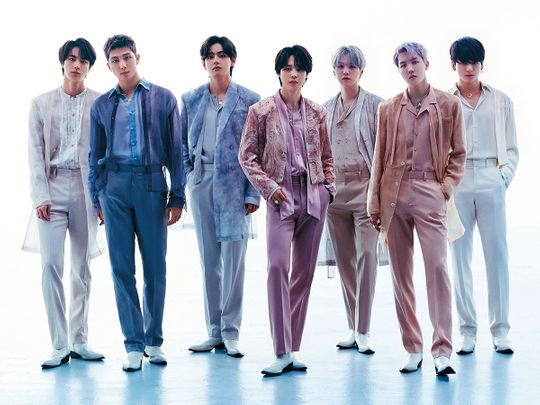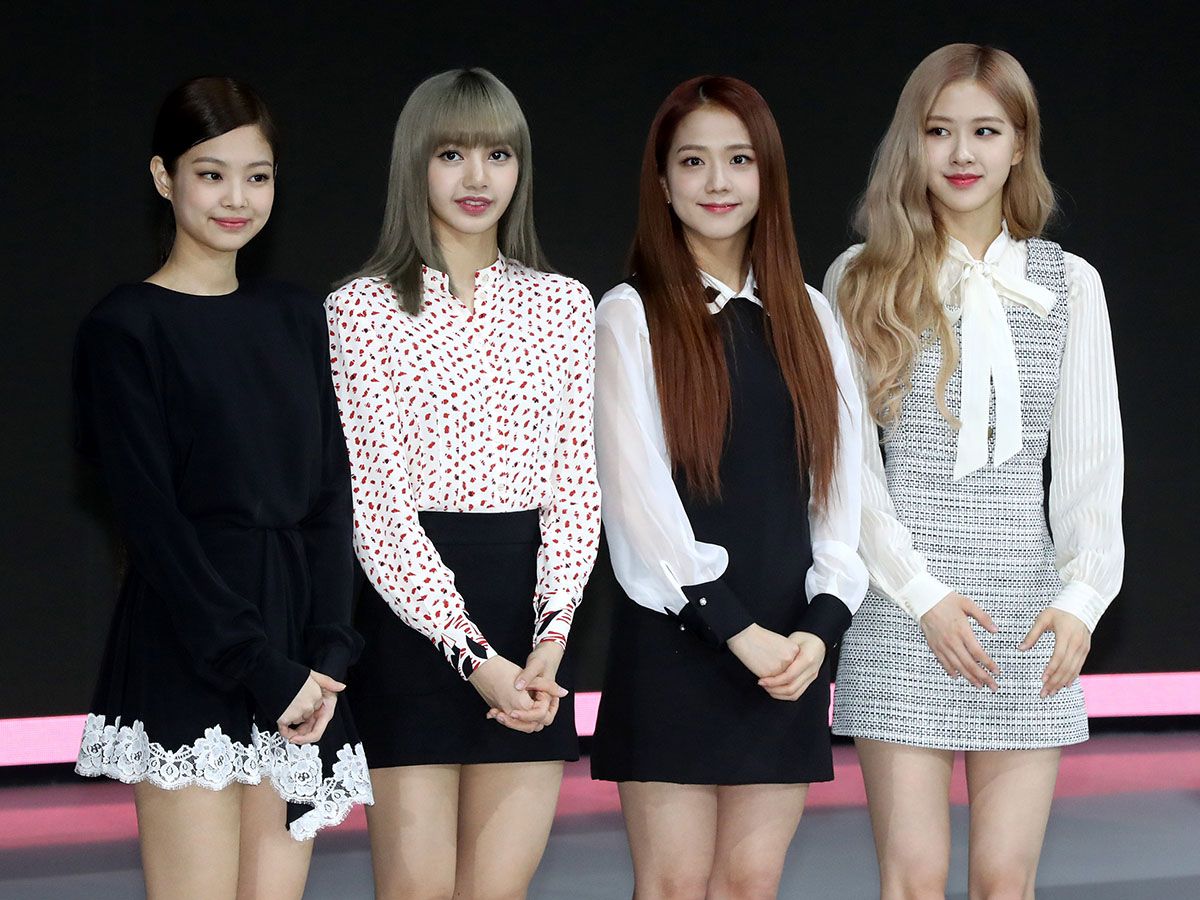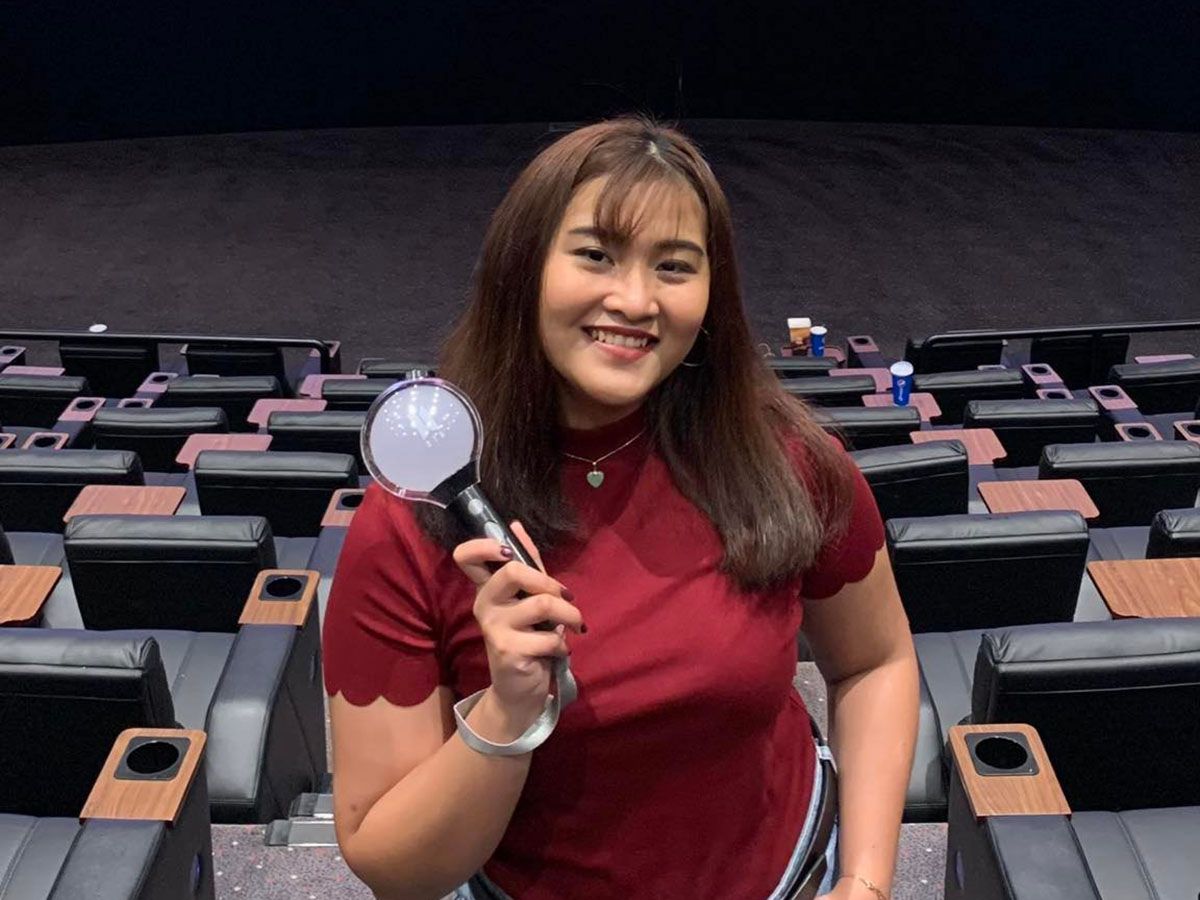
Blackpink in the area.
The Etihad Arena in Abu Dhabi reverberated with the chants for the global K-Pop girl band, in January, this year. Everywhere I looked, I saw most eager fans had adhered to the dress-code - they were dressed in black and pink, and wore headbands that spelt out Blackpink. An hour before the band was going to perform, a group of girls next to me were already rehearsing the upbeat and catchy track, ‘Boombayah’. A mix of Indians, Americans and a Sri Lankan, as they told me later, they didn’t really care that they didn’t know most of the Korean lyrics. They sang the chorus, and attempted the dance steps. They laughed when they couldn’t. Further away from them, two best friends, one Malaysian and the other Dutch, were discussing the latest album Born Pink earnestly and their favourite songs.
The performance began, amid loud and deafening cheers as Lisa, Rose, Jisoo and Jennie took the stage. The atmosphere was electric. There were fireworks, and blue, pink confetti exploded in the air, while the fans danced and sang along to ‘Pink Venom’. Some of them even tried to sing the Korean lyrics, even if they didn’t know them. Yet, in that moment, it didn’t matter for them. They were just happy to be near their idols.

Blinks (as Blackpink fans call themselves) screamed themselves hoarse, while waving the lightsticks in the air. I asked the girl next to me, how long she had been a Blackpink fan. She answered, “For the past four years. I love their songs so much. I even look up the translations of the Korean lyrics, when I don’t understand. They just make me so happy.”
‘They just make me so happy’ appears to be a common sentiment, when it comes to K-Pop.
The Hallyu, or Korean wave, tsunami - call it what you will, is the term that refers to the growth and prominence of South Korean culture. Its presence is everywhere - in the Korean dramas that most of us binge on, the cosmetics and the food. At the heart of Hallyu, is K-Pop. This brand of music escalated into a phenomenon from 2012 onwards, ever since PSY dropped the song ‘Gangnam Style’. Its addictive dance steps celebrated the Gangnam district in Seoul. The video itself earned over 3 billion views and was the top-selling song in the US for months. Just after the roaring success of Gangnam Style, bands like 2NE1 and BigBang held arena concerts in the US. The global stage for K-Pop was gradually being readied.
And then by 2016, BTS took over and revolutionised the face of K-Pop, with spectacular overseas album sales and the constant entries on the Billboard charts. The only K-Pop band with five Grammy nominations, Army (their fanbase) has much hope that one day, they’ll win the Grammy. Blackpink, NCT 127 and now Tomorrow X Together (popularly called TXT) have also made their impact on the charts. Blackpink’s Lalisa by Lisa won the Best Kpop Award at the MTV VMA’s last year, making her the first female Korean soloist to do so.
It has been a long road for K-Pop. Yet, most of the bands say - especially BTS, TXT, Seventeen and Blackpink say, they’ve always had their fans by their side. It’s made the journey a little less grueling for them.
Music is universal, after all
A K-Pop fandom is almost like a global community. For the most part, they’re always ready to spread the message of their idols, in whichever way they can.
Recently, BTS’ Jimin spoke to Vogue, explaining how the band’s Korean songs could make an impact in America. He said proudly, “Armys would translate all our songs into English and then send them across to the US in different mediums. Thanks to our American fans, we could get played on the radio.” Adding that was one reason, how he and the rest of the septet could come to the US for tours.
There’s something in these songs that resonates deeply with fans. It’s what helps them overcome the language barriers.
31-year-old Kalyani Nedungadi, an Indian consultant at Oxford, doesn’t believe language is ever a hindrance to enjoying music.
While her starting point in K-Pop was with BTS, she also explored the music from a range of Korean bands, including EXO, Seventeen, Monsta X as well. “It’s not hard for an Indian to get behind a song that has dance, colourful stages and outfits and lyrics in a language I don’t understand,” she says. Explaining further, “Although Indian popular culture tends to be Hindi-dominated, we’re all familiar with dancing to some song or the other that we don’t understand, whether in Punjabi or Tamil or any other language. Music is universal after all. Also, if we look at the success of Latin artists worldwide, is it so strange to imagine that Korean artists could have the same reach?”
Once you overcome the barrier of subtitles, you’ll discover that there’s so much to explore, adds Anandi Bandyopadhyay, quoting Korean filmmaker Bong Joon-ho. A 32-year-old Indian doctoral student of history in Seattle, USA, she says, “Even in moments when I don’t focus on the lyrics, different genres within K-Pop paint soundscapes of an urban culture that is different from mine.”
For Bandyopadhyay, K-Pop is about visual culture, performance, along with the auditory joy. “I am obsessed with the storytelling, and art production in the music videos, ranging from the slice-of-life format of some music videos and complex world-building in others,” she explains. There’s a strong sense of solidarity she feels that emerges from the latter, as the K-Pop community buzzes with fan theories.
Storytelling
Unique storytelling is central to K-Pop videos, along with the lyrics and choreography. For instance, in WoodZ’s ‘Love Me Harder’, the story appears to be about two lovers quarreling in a car. However, it takes a sudden turn and transforms into a supernatural thriller. You later see WoodZ chase after his dark alter-ego. Monsta X’s All In is filled with deep symbolism, which takes you through characters’ oppression and liberation.
One of the most riveting, and yet perplexing form of storytelling came with BTS’s ‘HYYH’ (Hwa Yang Yeon Hwa), or the youth trilogy as it is popularly called. Moving away from sanitised, upbeat videos, the septet tackled issues of mental health, poverty and troubles of youth. In short, they addressed subjects that were considered rather controversial in South Korea. The HYYH era began with ‘I Need You’, and saw songs such as Run, Save Me, and later Butterfly. The HYYH era is still a rabbit hole of innumerable theories, as fans are still trying to decode what exactly happened in the lives of the characters. It’s almost a matter of contention for them, as there has been no conclusive ending to the narratives.
This ‘BTS universe’ as it came to be called, appealed to fans globally, owing to the nature of issues. Leanne Gayem Guerrero, a Filipino executive at Umami Communications in Dubai, recalls the impact this storytelling had on her. “They did a whole series that basically portrays growing up with uncertainties as a young adult facing the world,” she explains. “This was followed by sentiments on losing your passion brought by burn out, and eventually finding and loving yourself in the end.”

For Guerrero, this struck a chord, as she was still in the process of navigating her life. “I didn’t know if I wanted to continue what I was studying. I was confused about what I wanted to do in life. I found this avenue to de-stress, and began to appreciate little things again.” She began to listening to all the BTS songs and consuming the media, which became her coping strategy. “It helped that there is an online community of translators, back then when Korean to English translations weren’t easily available.”
A mother and daughter’s perspective…
Eleven-year-old Tarini Rustagi, based in Dubai, is an avid fan of Blackpink, to the extent that her mother gifted her a Blackpink themed-birthday cake. Tarini explains why she likes K-Pop, “I like the music, and I like the dance. All the videos have different things going on. For instance, in the BTS track Fire, Suga holds someone’s hand who bursts into flames. In Blackpink’s D-d-dudu, Rose swings from a chandelier. There’s just something so interesting about all of it.” She likes the extravagance and the ‘over-the-top’ elements in these music videos.

Her mother Saranya Rustagi, an Indian communications professional based in Dubai, adds, “K-Pop is a great example of how music transcends music barriers. You don’t even need to understand the language to appreciate or enjoy the music. The videos are also mostly clean, and kid-friendly.” She adds that this is different from what she was used to, in her teenage years. “I’m glad that kids of today are able to listen to music that is clean, and there is awareness to make music like this.”
Hanieh Bilal, a clinical psychologist, based in Dubai, and her seven-year-old daughter both love BTS. “We connect more, when we watch BTS, and their shows, and we discuss their journeys.” The Pakistan national also cited the band as inspiration to her daughter, who is battling speech issues. “Whenever she gets frustrated about not finding a word, I tell her the story of BTS’s underdog story and how they just never gave up.” The group had to struggle a lot initially to get their break.
A parasocial relationship between idol and fans
K-Pop is not just music. The idols draw you into their world, as if you know them personally.
BTS’ Jungkook washes dishes and does his laundry with a million fans watching him on Weverse Live. Jimin listens to music, talks to fans, as he builds woodwork. Seventeen’s Hoshi getting giggly and red with Lee Youngji’s web interview, is still an endearing video for Carats (Seventeen fans). NCT127’s Mark and Haechan’s chaotic brotherly antics have a fanbase of their own. Somehow, there’s just a charm in watching these idols fight with each other over food, and then collapse into laughter. You laugh with them too.

They’ll even watch shows on Netflix, with their fans. This glowing stardom is stripped away, even when they’re all on stage. You’re almost one of them.
It’s not just this, they constantly feature on Weverse, to reply to fans. The famous ‘Yoongi marry me’ refrain, which began with fans constantly asking BTS’ Suga asking to marry them, has now emerged as a hilarious inside joke between the Army and BTS.
The K-Pop stars don’t seem inaccessible and out of reach, especially when they do Weverse Lives, or star in family friendly reality shows, like In The Soop and Run BTS. If you look at Twitter whenever a Weverse Live concludes, there’s a flood of fans just expressing their happiness, and laughing at the antics of their idols. “It feels like we are on a Zoom call with them,” one comment often reads.
Nedungadi adds, “There’s no shortage of content. If you like a group, you don’t just have only their music videos to watch. You can watch the behind-the-scenes content, lives. All in all, it’s really easy for companies to establish that parasocial relationship between idols and their fans.” She adds, “I listen to Kpop, because I find it fun, bouncy, pleasant to the ear, and I enjoy the behind the scenes content – it’s a nice break from real life. And generally, the artists, despite their wealth, feel more relatable to the average person than the bigger Western artists these days.”
She cites the early vlogs of BTS, as the band was one of the first to take fans through their journey in the form of videos, “They almost make you feel like you’re witnessing a journey, the culmination being their immense success. In fact, it could be said that the height of BTS’s relatability was when they were on the precipice of success, but not quite there yet – they were known enough to be rooted for as an underdog.” BTS had famously documented their early days of staying in one dormitory with each other, handing out pamphlets on the streets and asking people to come for their concerts, to finally winning their first major award in 2016. As a result owing to this personal engagement and closeness, as the time has come for the members to leave for their mandated military service, the BTS Army has vouched solemnly to wait for them to return. You’ll always see a ‘We’ll wait for you BTS’ trend on Twitter, every other day.
Zarah Fiaz, a project manager in Dubai, says that this particular quality of K-Pop idols is what sets them apart. "Korean artistes dedicate decades of their lives to their fans and give them access to their lives, through these Vlogs lives and social media content. This regular dosage of content gives fans an escape from their regular life. I think that's what pulls fans into the K-Pop world, just seeing how hard they work."
Healing with Kpop
K-Pop means catharsis for many fans.
They almost make you feel like you’re witnessing a journey, the culmination being their immense success. In fact, it could be said that the height of BTS’s relatability was when they were on the precipice of success, but not quite there yet – they were known enough to be rooted for as an underdog
Andrea D’Souza, an Indian national based in Dubai started translating the lyrics to BTS songs in 2020. “I translated their lyrics. Their positive message of self-love cemented the deal for me. It became the first of several coping mechanisms, when I felt anxious. From BTS, I started seeking out other reality series on YouTube, and it just became a huge mood booster,” explains D’Souza, who now also listens to Seventeen, Stray Kids, Shinee, Super Junior, Exo and TXT. She adds that K-Pop was a major factor on why she visited South Korea, and got into K-dramas.
BTS’ message of self-love helped D’Souza heal her own fears and anxieties. “The way they conduct themselves through all the hardships in the past, even now, is truly inspiring. They make me want to be a better person. Their message of self-love and acceptance is something I hold close to my heart. I don’t think I can ever leave this beautiful world of Kpop,” she adds.
Bhumika Anand, a writer and the founder of Bangalore Writer's Workshop, based in Bengaluru, India, wanted to move away from the hard rock and heavy metal, she had grown up with. “I wanted to discover new, happy music in 2019 and that's when I first heard BTS and K-Pop.”
BTS became a balm during the Covid-19 pandemic. “We had very little to laugh about, at that time. Discovering BTS led me to reiterate my own value system. They were not cynical and instead spoke about healing, love, and community. They raised their voices for trauma, mental health issues, and human rights in Korean society that seemed to be like Indian society - conservative and concerned with appearances. They did all this while having simple, clean, silly fun,” she elaborates.
Being a BTS Army member has been life-changing for her, she says. “I even formed my own mini community of Armys and the group has been life-affirming. Just like the band itself,” explains Anand.
(Note: This article was first published on April 20, 2023)







